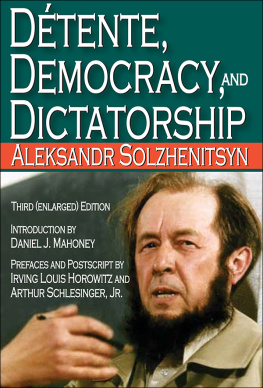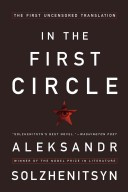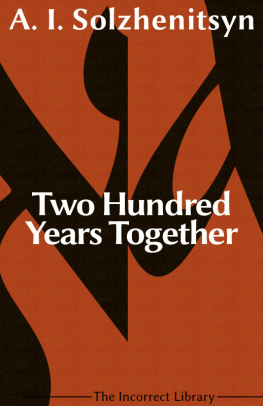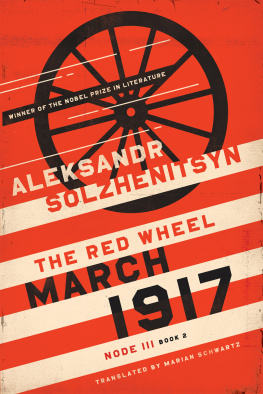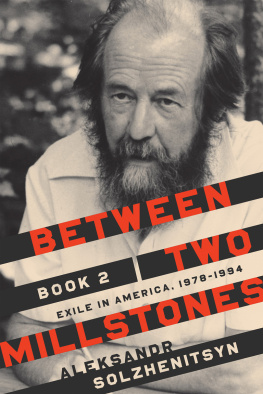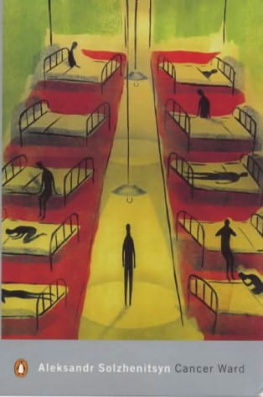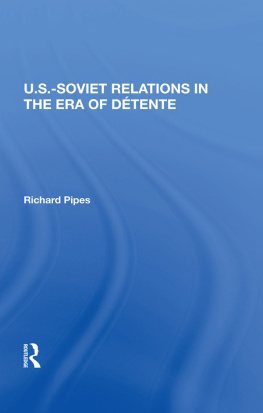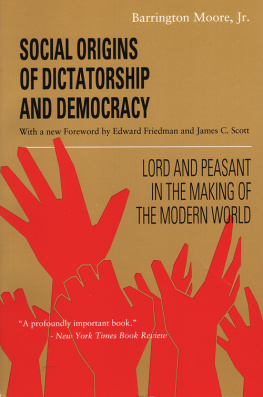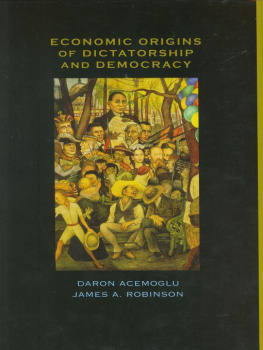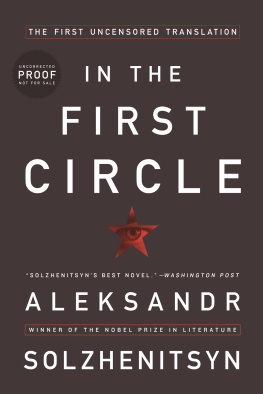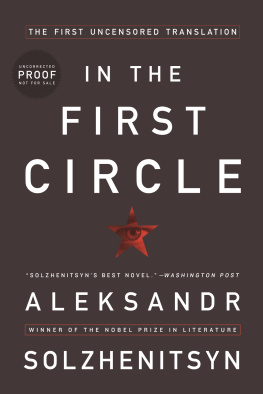First published 2009 by Transaction Publishers
Published 2017 by Routledge
2 Park Square, Milton Park, Abingdon, Oxon OX14 4RN
711 Third Avenue, New York, NY 10017, USA
Routledge is an imprint of the Taylor & Francis Group, an informa business
Copy 2009 by Taylor & Francis.
All rights reserved. No part of this book may be reprinted or reproduced or utilised in any form or by any electronic, mechanical, or other means, now known or hereafter invented, including photocopying and recording, or in any information storage or retrieval system, without permission in writing from the publishers.
Notice:
Product or corporate names may be trademarks or registered trademarks, and are used only for identification and explanation without intent to infringe
Library of Congress Catalog Number: 2009011451
Library of Congress Cataloging-in-Publication Data
Solzhenitsyn, Aleksandr Isaevich, 1918-2008.
Dtente, democracy, and dictatorship / Aleksandr Solzhenitsyn.
3rd enlarged ed.
p. cm.
Previously published: New Brunswick, N.J. : Transaction Books, c1980, under title Dtente.
Based on addresses delivered in 1975 in Washington, D.C. and New York, and in 1978 at Harvard University in Cambridge, Mass.
Includes bibliographical references and index.
ISBN 978-1-4128-1030-2 (alk. paper)
I. Soviet Union-Foreign relations--1953-1975. 2. Soviet Union-Foreign relations--United States. 3. United States--Foreign relations--Soviet Union. 4. Soviet Union--Politics and government--1953-1985. 5. Civilization, Modern--1950- 6. Solzhenitsyn, Aleksandr Isaevich, 1918- 2008. I. Solzhenitsyn, Aleksandr Isaevich, 1918-2008. Dtente. II. Title.
DK274.S613 2009
327.47073--dc22
2009011451
ISBN 13: 978-1-4128-1030-2 (pbk)
Contents
Irving Louis Horowitz
Arthur Schlesinger, Jr.
Daniel J. Mahoney
Irving Louis Horowitz
Preface I
The Washington, DC Addresses:
An Amnesty International of One
Irving Louis Horowitz
The only meaningful comparison that one can make to the impact of Solzhenitsyns speeches during his famous visit to the United States is Winston Churchills famous Iron Curtain speech in Fulton, Missouri in 1947, in which he formally declared the beginning of the Cold War. While the Churchillian event was conducted, quite properly, in an abbey, under the most austere, collegiate auspices in the American Midwest, Solzhenitsyns speech, under the sponsorship of the American Federation of Labor and Congress of Industrial Organizations (AFL-CIO), represented an almost typical Washington happening. As a study in contrasts, it would be hard to improve upon the introductory remarks of George Meany, with his carefree, working-class mannerisms straight out of Casey Stengel, and Solzhenitsyns classical nineteenth-century Russian oratory. One is tempted to declare: Only in America!
Solzhenitsyns opening speech in Washington, on June 30, 1975, can only be described as a cross between a Southern Baptist Convention and a chapter from televisions This Is Your Life. Solzhenitsyn was introduced to people (some from his past) who have also managed to escape the ferocious world of Soviet terrorisma sailor who had jumped ship, was returned and finally was permitted to leave under United States pressure, and a United States citizen who spent a number of years in the Gulag and is now a government employee, Alexander Dolgun. These people were brought together not so much because of shared interests, but because they had shared perils. The ceremonialism of the occasion was marked by the presence of a bishop of the Russian Orthodox Church, who offered the invocation and benediction, and several secular bishops and dignitaries, past and present, from the United States government, such as Daniel Patrick Moynihan, William Rogers, Melvin Laird, and James R. Schlesinger. It was Kremlinology in reverse. Seating assignments became important to establish the hierarchy of power present, and one gossiped over the absence of Kissinger, as much as over the appearance of Schlesinger.
All of this background paraphernalia was neither unimportant nor incidental. With remarkable agility, Solzhenitsyn had become an American politician manque, traveling the length and breadth of the country, pumping hands, kissing babies and assuming a reverential stance before the proper monuments. He is sufficiently Westernized to know that sponsorship is legitimacy. The vocation of orator is not a universe of Wittgensteins making, i.e., whereof one does not know, thereof one does not speak. Rather, whatever one knows, be sure it gets listened to. That Solzhenitsyn did quite brilliantly and adroitly, by having his premiere effort sponsored by the AFL-CIO national office. It is, after all, the central organization of the American working class, and hence it is an organization whose roots touch the fabric of American life, and presumably is unlikely to be called reactionary in its essence. That, as much as what Solzhenitsyn said, must have upset President Gerald Ford and Henry Kissinger, both of them have enough trouble with organized labor and a disorganized Congress.
Fusion of Sentiments
Solzhenitsyn somehow fused and organized a welter of critical sentiments and feelings that most ordinary Americans still retain toward the Soviet government. The Cold War may be over and spaceship diplomacy may be the next step toward political paradise, but still there is that undigested residue of mistrust, with thirty years standing. There are differences between us and them, between Americans and Russians, and even more, between democrats and communists. Solzhenitsyn tapped that sentiment, and understood how to fuse it and how to use it to develop a broad coalition. His speech revealed a high level of sophistication. He employed the organizing symbols and myths of American political life, extending from the anti-bourgeois spirit to pro-democratic sentiment.
One must consider that President Fords Helsinki trip would have been just one more stop on a European itinerary if Solzhenitsyn had not raised the SOS and pointed out that Helsinki is what the European trip was all about. Helsinki, he remarked, represented the final solution of World War II, the absolute crystallization of a divided Europe, the transformation of the Iron Curtain into a Steel Girder. Only then were Ford and Kissinger compelled to change the rhetoric, if not the reality, of the situation. The fact is that the Helsinki agreement was viewed by the President of the United States as a new opportunity for humanitarianism, and by the Premier of the Soviet Union as a final termination of all Western interference in East European affairs. The agreement settled very little, but that is not the point. The point is that a writer, Solzhenitsyn, became, albeit briefly, a counterforce to Kissinger in American political life. In rocking the policy consensus, the foreigner and exiled dreamer, Solzhenitsyn, had the weight of American tradition on his side.
A great deal has been said, and much has been made of Solzhenitsyns religious mysticism and pan-Slavism. If these elements exist (they have been reflected in his literary works), they are not the paramount concerns of Solzhenitsyn the political figure. There is nothing mystical or theological about his political sentiments. He reveals himself to be an old-fashioned Western liberal, a believer in democratic pluralism and laissez-faire individualism. In part, his position derives from his role as a writer in Western exile. In part, too, it derives from a clear decision to assume a posture to the political right of the dissidents who remain in the Soviet Union, such as Roy Medevev and the other

